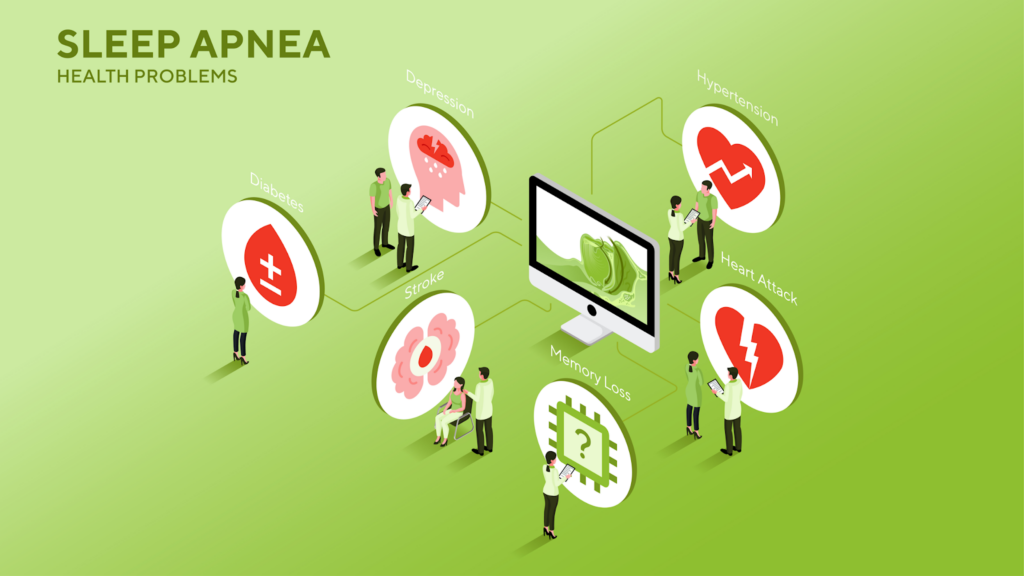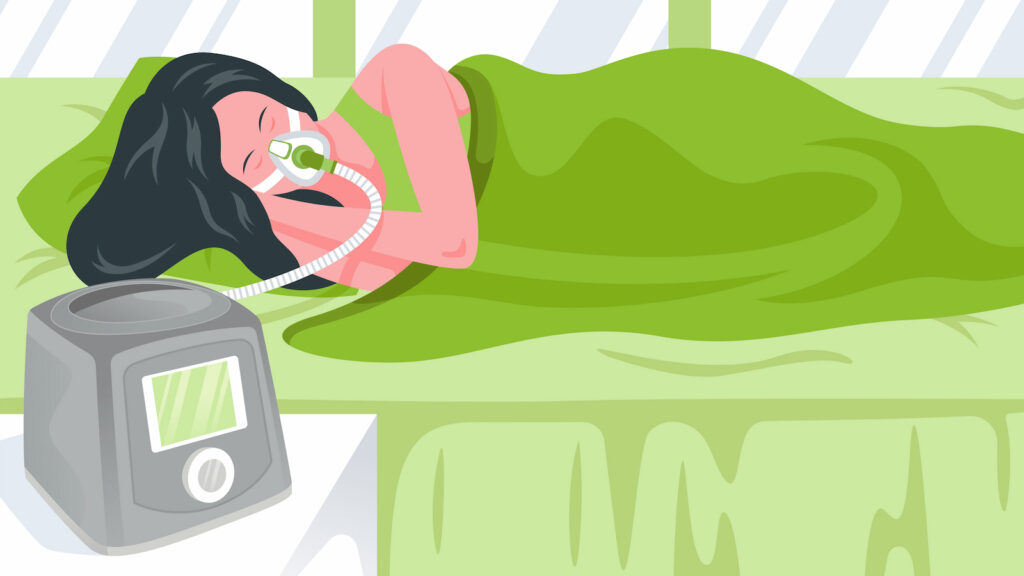When it comes to common health issues that often go unnoticed, sleep apnea and its connection to heart disease stands out as a critical area of concern.
In this article, we’ll shed light on the often overlooked but significant impact of a disrupted night’s sleep on cardiovascular health.

As we explore the nuances of sleep apnea, a condition characterized by repeated interruptions in breathing, we’ll discuss its prevalence, the potential for severe heart-related consequences, and the importance of recognizing and addressing this condition.
Join us as we delve into how sleep apnea affects your sleep quality and poses a risk to your heart and why awareness and proactive health management are essential to reducing these risks.
Sleep Apnea and Heart Disease: A Silent Threat
Sleep apnea is a widespread sleep disorder characterized by repeated breathing interruptions during sleep, primarily caused by an obstructed or narrowed airway.
Yet, despite its common occurrence, experts estimate that an alarming 8 out of 10 cases of moderate to severe obstructive sleep apnea (OSA) remain undetected.
Many individuals suffer from symptoms like disrupted sleep, daytime exhaustion, and chronic headaches without realizing they have this potentially harmful condition.
And even if they do know something needs to be fixed, they may lack access to the specialists or healthcare required to diagnose and address the issue.
Sleep Apnea’s Impact on Heart Health
Sleep apnea doesn’t discriminate by age but is more prevalent among middle-aged adults and seniors, with men at a higher risk than women.
This widespread occurrence has significant implications, leading to various cardiovascular issues if left untreated.

Sleep apnea’s connection to heart disease is intricate and not to be underestimated.
Oxygen deprivation during apnea episodes places significant stress on the cardiovascular system.
This ongoing strain can lead to various cardiac conditions, including:
- Increased Blood Pressure: Every time you stop breathing, the oxygen levels in your blood decrease, leading to temporary spikes in blood pressure as your body tries to get more oxygen. Over time, these frequent blood pressure spikes can lead to hypertension, which is a risk factor for heart disease.
- Strain on the Heart: With sleep apnea, the heart has to work harder to pump blood to compensate for the lack of oxygen, leading to an enlarged heart and a higher risk of heart failure.
- Arrhythmias: The stress and strain from frequent night-time awakenings and oxygen changes can lead to irregular heart rhythms, such as atrial fibrillation, which can increase the risk of stroke and heart disease.
- Coronary Artery Disease and Heart Attacks: The combination of high blood pressure, increased stress on the heart, and higher levels of certain chemicals in the blood that cause inflammation can lead to the buildup of plaques in arteries (atherosclerosis), increasing the risk of heart attacks.
- Metabolic Syndrome: Sleep apnea is associated with metabolic issues, including obesity, insulin resistance, and type 2 diabetes, which are all risk factors for heart disease.
It’s important to note that not everyone with sleep apnea will develop heart issues, but the risk is significantly higher, especially if sleep apnea is severe and left untreated.
Minimizing Cardiovascular Risks Through Effective Sleep Apnea Management
Fortunately, this intricate connection between sleep apnea and heart disease risk means that treatments for sleep apnea often show rapid and substantial improvement in said risk factors.
In this section, we’ll explore how effective management of your sleep apnea symptoms can drastically reduce cardiac risk factors.
How PAP Therapy Can Reduce the Risk of Heart Disease
Continuous Positive Airway Pressure (CPAP) therapy is the gold standard treatment for obstructive sleep apnea.

It helps maintain regular breathing during sleep, using pressured air to keep your airways open.
However, adequate CPAP treatment has been shown to improve sleep apnea symptoms and help minimize cardiac risk factors.
Ways in which PAP therapy can help include:
- Stabilizing Blood Pressure: By preventing airway collapse and ensuring continuous breathing, PAP therapy can reduce nightly blood pressure spikes and help lower daytime blood pressure levels over time. This is particularly important for individuals with hypertension, which is a common comorbidity of sleep apnea.
- Improving Heart Rhythm: Regular use of PAP therapy can reduce the frequency of arrhythmias, particularly atrial fibrillation, which is more common in people with OSA. Promoting stable breathing patterns helps maintain a regular heart rhythm.
- Decreasing Strain on the Heart: By preventing low oxygen levels and sleep disturbances, PAP therapy ensures the heart doesn’t have to work as hard to circulate oxygen throughout the body. This can reduce the workload on the heart, potentially lowering the risk of heart failure.
- Reducing the Risk of Coronary Artery Disease: Effective treatment of sleep apnea with PAP therapy can reduce the factors that contribute to coronary artery disease, such as high blood pressure, inflammation, and glucose metabolism issues. This may decrease the risk of heart attacks.
- Improving Insulin Sensitivity: PAP therapy can help in improving insulin sensitivity and reducing the risk of type 2 diabetes, which is a significant risk factor for heart disease.
The Importance of Quality Sleep in Mitigating Heart Disease Risk
Sleep apnea drastically affects the quality of your sleep—even if you don’t remember waking in the night.
Each apnea episode interrupts your sleep cycle, preventing REM sleep and causing you to wake up tired and sluggish.

Quality sleep is essential for overall well-being, and insufficient sleep can negatively affect heart health.
A few of the ways in which poor sleep can impact your health include:
- Blood Pressure Regulation: Sleep lowers blood pressure, giving the heart a rest. Disrupted sleep can prevent this, contributing to hypertension and heart risk.
- Heart Rate Regulation: Normal sleep slows the heart rate, reducing stress on the heart. Irregular sleep can lead to increased heart rate and stress.
- Stress Reduction: Adequate sleep regulates stress hormones, reducing heart strain. Poor sleep can increase stress and heart disease risk.
- Inflammation Reduction: Good sleep lowers body inflammation, protecting against heart disease. Lack of sleep is linked to increased inflammation and cardiovascular issues.
- Diabetes and Obesity Prevention: Proper sleep helps maintain a healthy weight and metabolism, reducing heart disease risk. Sleep deprivation can lead to obesity and diabetes.
- Healing and Repair: Sleep allows the heart and blood vessels to repair and rejuvenate, which is essential to maintaining heart health.
Given these points, sleep quality and duration should be a key component of any heart health strategy.
Adults are generally recommended to get 7-9 hours of good quality sleep per night, although individual needs can vary.
If you’re having trouble sleeping, are experiencing symptoms of a sleep disorder like sleep apnea, or if you have concerns about your sleep and heart health, it’s important to speak with a healthcare professional.
They can provide guidance and, if necessary, a referral to a sleep specialist to ensure your sleep and heart health are appropriately managed.
Why An Active, Healthy Lifestyle is Essential to Sleep Apnea Management
One of the most important steps to address these issues is to make lifestyle adjustments where possible.

Critical facets of a healthy, active lifestyle include:
- Regular Physical Activity: Regular exercise, such as brisk walking, cycling, swimming, or other aerobic activities, strengthens the heart, improves circulation, and enhances overall fitness. It helps in weight management, reducing the severity of sleep apnea and decreasing the risk of heart disease.
- Balanced Nutrition: Eating a diet rich in fruits, vegetables, lean proteins, and whole grains while limiting processed foods, sugars, and unhealthy fats can help maintain a healthy weight, reduce inflammation, and provide the body with essential nutrients for optimal function.
- Adequate Rest: Ensuring 7-9 hours of quality sleep per night helps regulate stress hormones, maintain heart health, and improve sleep apnea symptoms. A consistent sleep schedule is also crucial.
- Stress Management: Techniques such as mindfulness, meditation, hobbies, and socialization can reduce stress levels, which are vital for heart health and improving sleep quality.
- Avoidance of Harmful Behaviors: Staying away from smoking, excessive alcohol consumption, and other harmful substances significantly benefits cardiovascular health and can improve sleep apnea.
- Regular Health Check-ups: Monitoring health metrics and keeping up with regular medical check-ups can catch potential issues early and keep your health plan on track.
When combined with PAP therapy, implementing healthy, active routines into your day-to-day activities can bring widespread health benefits.
Frequently Asked Questions About Sleep Apnea and Heart Disease
Is there a connection between sleep apnea and heart disease?
Yes, untreated sleep apnea can lead to an increased risk of heart arrhythmias, coronary heart disease, and even heart failure.
Can heart damage from sleep apnea be reversed?
Treatment for sleep apnea, such as CPAP therapy, can help mitigate the effects on the heart over time—particularly when paired with a healthy diet and regular physical activity.
Can a CPAP machine affect your heart?
A CPAP machine helps regulate breathing during sleep, reducing strain on the cardiovascular system and making it generally beneficial for cardiac health. So, while the CPAP machine won’t directly impact your heart, it can significantly improve risk factors and reduce cardiovascular strain.
What is the life expectancy of someone with sleep apnea?
Life expectancy varies based on severity and treatment, but with proper management, individuals can live healthy lives, reducing risks like high blood pressure or stroke.
Can treating sleep apnea improve existing heart conditions?
Yes, effectively treating sleep apnea with therapies like CPAP can reduce cardiac strain, potentially improving conditions like hypertension and arrhythmias and generally supporting heart health.
How do regular check-ups help in managing sleep apnea and heart disease risk?
Regular check-ups can detect changes in health early, guide treatment adjustments, and monitor the effectiveness of existing management plans for both sleep apnea and heart health.
For more on the importance of regular follow-ups, consult our guide!
Final Thoughts
Awareness and proactive management are paramount in mitigating heart disease risks related to sleep apnea.
Understanding the risks, recognizing the symptoms, and seeking timely intervention can significantly affect your quality of life and long-term health.
If you or your loved ones experience signs of sleep apnea—such as chronic snoring, daytime fatigue, or sudden awakenings—it’s crucial to contact a specialist.
A sleep expert can provide a proper diagnosis and recommend the best course of action, often involving CPAP therapy.
Remember, managing sleep apnea is not just about improving sleep quality; it’s critical to safeguarding your heart health.
Effective treatment, such as Continuous Positive Airway Pressure (CPAP) therapy, has been shown to alleviate the symptoms of sleep apnea and, in turn, reduce cardiac risk factors significantly.
When combined with a healthy lifestyle, this therapy can stabilize blood pressure, improve heart rhythm, decrease the strain on the heart, and reduce the risk of coronary artery disease.
For those already navigating the path of CPAP therapy, or if you’re just beginning to consider it, CPAP Supply stands ready to support you.
As Canada’s leading online supplier of CPAP machines, parts, and accessories, CPAP Supply is committed to your satisfaction and well-being. Our team understands the intricacies of CPAP equipment and can assist with any questions, ensuring that your therapy is as effective and comfortable as possible.
Taking the step to manage sleep apnea is a step towards a healthier heart and a better life.
Don’t let this silent threat go unnoticed. Reach out, seek help, and take control of your health today.
Your heart and your future will thank you.
References:
- Heart.org: Sleep Apnea and Heart Health
- Harvard Health: How Does Sleep Apnea Affect the Heart?
- Johns Hopkins Medicine: The Dangers of Uncontrolled Sleep Apnea
- Mayo Clinic: Sleep Apnea
- Healthline: Sleep Apnea and Coronary Artery Disease: What’s the Connection?
- NIH: Cardiovascular Disease Risk in Obstructive Sleep Apnea: An Update
- Cleveland Clinic: Sleep Apnea
- Mayo Clinic: Obstructive Sleep Apnea

